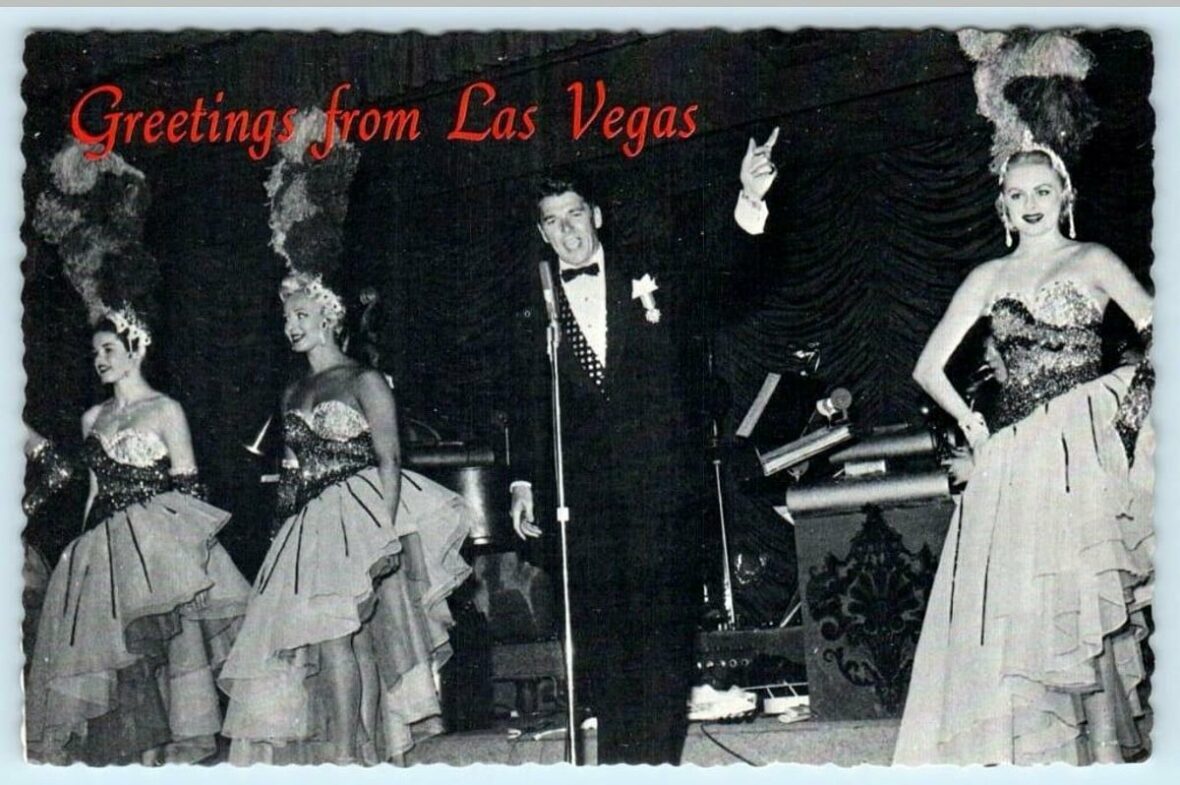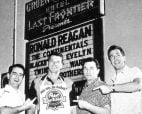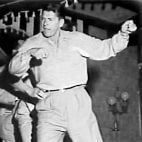LOST VEGAS: Ronald Reagan Had a Las Vegas Lounge Act

Posted on: December 29, 2022, 07:00h.
Last updated on: December 28, 2022, 11:38h.
Yes, a future US president once sang and danced on the Las Vegas Strip. And you want to know something stranger? Ronald Reagan was, by most accounts, all right at it.

From Feb. 15 to 26, 1954, Reagan, who had just turned 43, topped the bill in the Ramona Room at the Last Frontier. At 600 seats, this was the largest showroom in Las Vegas. As the show’s emcee, Reagan told self-deprecating jokes with aw-shucks charm while introducing four acts: a barbershop quartet called the Continentals; the Blackburn Twins featuring Evelyn Ward (a Broadway showgirl who happened to be the mother of future pop star David Cassidy); a dancing acrobatic troupe called the Honey Brothers; and the house chorus line, nicknamed the Adorabelles.
Reagan did more than introduce the Continentals. He interacted with the foursome in zany sketches that appeared throughout the show. The running gag was not unlike Lucille Ball’s with Desi Arnaz on I Love Lucy: Reagan tried desperately to be included in their stage act. And, though he hammed it up for laughs, he hoofed it up and sang songs such as “Sweet Adeline” with them serviceably.
Serious Comedy Business

Reagan took the gig quite seriously. A month earlier, he rented a Hollywood soundstage and rehearsed with the Continentals for a week, up to four hours a day, until his parts were nailed. After that, they workshopped the act with a week of performances at the Statler Hotel in downtown L.A.
The hard work paid off. The Vegas shows sold out, Variety magazine wrote that Reagan had a “winning personality,” and Reagan was offered a return engagement.
But even before Reagan proved himself, the Last Frontier was happy to have a bona-fide movie star working for them. Most steered clear of playing Vegas at the time, fearing the effect of the has-been aura on their image. But Reagan had just served as supporting actor to a chimpanzee in the 1951 movie Bedtime For Bonzo. There was no lower place for his career to go. He commanded so little respect, a newspaper advertisement for the engagement misspelled his last name “Regan.”
Anyway, he had little choice.
The studios had stopped offering Reagan his customary $75K-per-picture fee at the same time he had a brand new wife (the former Nancy Davis), an infant daughter (Patti), and mortgages on his Pacific Palisades home and a 350-acre ranch in the Malibu Hills. He also owed child-support payments of $500 a month to his first wife, Jane Wyman, as well as a whopping $18K in back taxes to the IRS.
So when his agent, Arthur Park, proposed a Vegas nightclub act, Reagan listened. As past president of the Screen Actors Guild, he had already emceed dozens of Hollywood charity benefits, where he developed a talent for introducing entertainment acts with humorous patter. And the money was right: $11K for two weeks work.
Originally, Park intended to book Reagan into the El Rancho Vegas. But that casino hotel’s owner, Beldon Katleman, insisted that the show run over the Christmas holiday. That was pretty much a deal-breaker for Reagan, but what really torpedoed the idea was the headlining act. Lili St. Cyr was one of America’s premier strippers, and Reagan was having none of that.

So Why Didn’t Reagan the Lounge Lizard Play Vegas Again?
While driving home from Vegas to LA, Ronald and Nancy had a heart-to-heart and decided to turn down the Last Frontier’s offer for a return engagement. Reagan would instead take one last Hail Mary pass at Hollywood stardom. Though that dream continued to elude him, his next two films, Prisoner of War and Cattle Queen of Montana, did well, which led to an eight-year run hosting CBS-TV’s General Electric Theater. That show made Reagan wealthy again and generated hundreds of paid offers for him to speak as GE’s spokesperson. These engagements earned him the nickname “The Great Communicator” and led directly to the political career we all know.
Decades later, Nancy Reagan spoke to PBS-TV about her late husband’s Vegas lounge career.
“He rolled with it, but it hurt, of course, when (his) career dried up — of course it hurt,” she said. “But … he’d get back to the deep belief that everything happens for a reason. And that whatever happened to him there, (there) was a reason for it.”
“Lost Vegas” is an occasional Casino.org series featuring remembrances of Las Vegas’ lesser-known history.
Related News Articles
Source: casino.org
